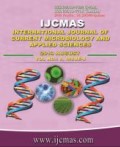


 National Academy of Agricultural Sciences (NAAS)
National Academy of Agricultural Sciences (NAAS)

|
PRINT ISSN : 2319-7692
Online ISSN : 2319-7706 Issues : 12 per year Publisher : Excellent Publishers Email : editorijcmas@gmail.com / submit@ijcmas.com Editor-in-chief: Dr.M.Prakash Index Copernicus ICV 2018: 95.39 NAAS RATING 2020: 5.38 |
Zinc (Zn) is one of the most essential micronutrients required for normal plant growth and development. Even though considerable quantity of inorganic Zn is applied in soil but significant quantity of it gets converted into unavailable forms. Zn solubilising microorganisms are the potential substitute for Zn supplement to plant from soil. Among the four isolates that were screened for Zn solubilization, fungal ones performed better than bacterial ones and Aspergillus sp. in particular, outperformed every other isolate in the test. It produced a clear halo zone of 22.7 mm on solid medium amended with ZnO. It also produced the biggest halo zone on ZnCO3 amended media which was followed by Penicillium sp. and Bacillus megaterium. Aspergillus sp. also gave significant release of Zn in broth assay amended with ZnO and ZnCO3 (88 and 62 ppm), respectively. The pH of the broth was acidic in all the cases ranging from 4.6 to 6.4 in ZnO and from 5.1 to 6.7 in ZnCO3 amended media. A pot culture experiment with maize for 60 days was conducted which revealed that seed inoculation with Aspergillus sp. superiorly enhanced total dry weight of plant (63.21 g/plant) and N (2.42%), P (0.432%) and Zn (25.79 ppm) contents.
 |
 |
 |
 |
 |